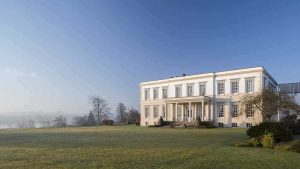Why Are Cells the Size They Are?
Organisers: Dustin Marshall, Craig White
Date: 13 – 16 July 2025
Location: Buxted Park, East Sussex, UK
Size determines function – larger organisms are very different to smaller organisms. Understanding size-function relationships is a longstanding goal of biology (Thompson, 1917). This problem has taken on new urgency because, across the tree of life, organisms are shrinking in response to human-mediated change. Across a broad swathe of organisms and particularly unicells, global warming and shifts in nutrient regimes are inducing size declines (Forster, Hirst & Atkinson, 2012; Hillebrand et al., 2022). What are the consequences of these changes in size? How do they affect biological function, which in turn drive the ecosystem services we rely upon?
We believe a new synthesis is required for understanding how and why cell size varies, as well as the functional consequences of changes in cell size. From cell biologists to biogeophysicists, there is a strong, unifying interest in understanding cell size and its dynamics but these very different fields have barely overlapped in the past. We propose to bring together a diverse group with very different skillsets and expertise to tackle this urgent problem of understanding cell size.
Our goal is to create a new theory base, that integrates the latest advances in biophysics, evolutionary biology and ecological modelling in order to better understand cell size. We anticipate a series of talks that outline what we know, what needs to be done both empirically and with regards to theory, and highlight the untapped potential of overlapping research interests across disparate fields. We hope that this workshop will form the foundation for an ongoing collaboration between subdisciplines to tackle this urgent and interesting problem. As a first step, we will focus principally on unicells in the hope that they avoid some of the interesting but challenging complications of understanding cell size in multicellular organisms.
ECRs* interested in the causes and consequences of changes in cells size are invited to apply to attend this meeting.
*Defined as PhD, postdocs and PIs in the first three years of their first appointment.
Organisers & speakers
Dustin Marshall Monash University, Australia
Craig White Monash University, Australia
David Atkinson University of Liverpool, UK
Sinéad Collins University of Edinburgh, UK
Hayley Cameron The University of Melbourne, Australia
John Paul DeLong University of Nebraska–Lincoln, USA
Zoe Finkel Dalhousie University, Canada
Giulia Ghedini Gulbenkian Institute, Portugal
Vosjava Gjoni Università degli Studi di Palermo, Italy
Christopher Klausmeier Michigan State University, USA
Petra Levin Washington University in St Louis, USA
Naomi Levine University of Southern California, USA
Elena Litchman Michigan State University, USA
Emilio Marañón Universidade de Vigo, Spain
Holly Moeller University of California, Santa Barbara, USA
Samraat Pawar Imperial College London, UK
Van Savage University of California, Los Angeles, USA
Maren Striebel University of Oldenburg, Germany
Early-career researchers
Applications for this Workshop are now closed.
We offer 10 funded places for early-career researchers (PhD, postdocs and PIs in the first three years of their first appointment) to attend our Workshops along with the 20 invited speakers. We just ask that you pay for your own travel costs. If you would like to attend please complete the online application form and include a one page CV and a letter of support from your supervisor. If your supervisor would prefer to send the letter directly to us please ask them to email it to workshops@biologists.com
All attendees are expected to actively contribute to the Workshops by asking questions at presentation sessions and taking part in discussions, as well as giving a short talk on their research.
At some Workshops, early-career researchers are given additional responsibilities to promote their involvement, such as:
-
- Write a blog post for one of our community sites: The Node, FocalPlane or preLights
- Summarise the previous day’s themes to set the scene for the next day’s sessions
- Propose future directions and collaborations
- Make a short two minute video on their experience at the Workshop
Most of these activities would be carried out in pairs or small groups and often with the support of more senior scientists present.
About Buxted Park

The Workshop will be held at the beautiful Buxted Park in East Sussex which dates back to the 12th century. The current house was built in 1722 by Sir Thomas Medley and is an elegant Grade II Palladian mansion set in 312 acres of parkland. Over the years it has played host to a number of high profile visitors including William Wordsworth, Winston Churchill, and George V and Queen Mary. Whilst it was a health hydro in the 1960s Gregory Peck, Dudley Moore and Marlon Brando were regular visitors.
Buxted Park is less than 25 miles from Gatwick Airport and 60 miles from Heathrow Airport. There are direct trains taking 1 hour 10 minutes from London Bridge to the village of Buxted which is only a mile away from the hotel.
Buxted Park Hotel
Station Road
Buxted
East Sussex
TN22 4AY
Tel: +44 (0) 1825 733333








You must be logged in to post a comment.